Michael Tully In Conversation With James Gray (THE IMMIGRANT)
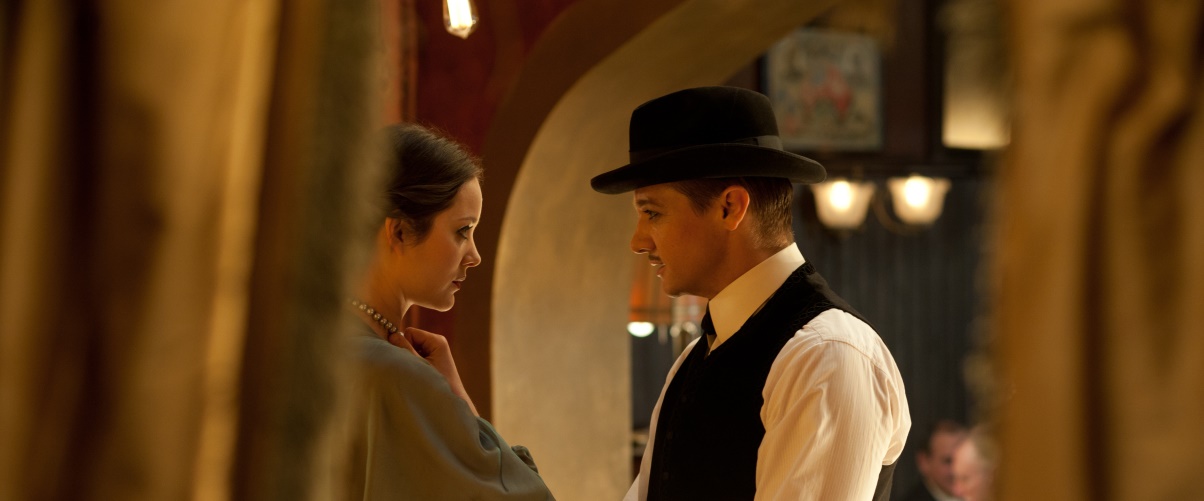
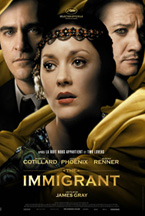 For my money, James Gray is the best American director of his generation. James Gray movies are as infused with elements of opera and painting and literature as they are classic cinema, and while his ambitiously realized worlds are indebted to the masters of yore, they nonetheless remain his very own. The Immigrant is no exception. A breathtaking period piece that follows a Polish immigrant’s arrival on Ellis Island in 1921 (Marion Cotillard) and her subsequent doomed relationship with a low-rent hustler (Joaquin Phoenix), The Immigrant is as impressive as modern cinema can possibly get. And yet its release was proactively sabotaged by distributor The Weinstein Company. In a brief yet meaty phone conversation last week, I confirmed my own hunch as to why this was before digging into other matters: The Immigrant’s astounding final shot, celluloid as a dying tool, and an inspiring screed about how a screenwriter’s imagination must be used to combat market forces and preserve the power of art!
For my money, James Gray is the best American director of his generation. James Gray movies are as infused with elements of opera and painting and literature as they are classic cinema, and while his ambitiously realized worlds are indebted to the masters of yore, they nonetheless remain his very own. The Immigrant is no exception. A breathtaking period piece that follows a Polish immigrant’s arrival on Ellis Island in 1921 (Marion Cotillard) and her subsequent doomed relationship with a low-rent hustler (Joaquin Phoenix), The Immigrant is as impressive as modern cinema can possibly get. And yet its release was proactively sabotaged by distributor The Weinstein Company. In a brief yet meaty phone conversation last week, I confirmed my own hunch as to why this was before digging into other matters: The Immigrant’s astounding final shot, celluloid as a dying tool, and an inspiring screed about how a screenwriter’s imagination must be used to combat market forces and preserve the power of art!
HAMMER TO NAIL: In film nerd circles, there’s been ongoing speculation about what in the hell happened with the release of this movie. For me, it’s always been pretty clear and basically comes down to one question: Is the cut that you presented at Cannes the same cut that was released theatrically?
JAMES GRAY: Yes, the cut that you saw in Cannes is my cut. There’s never been any controversy about the movie. The movie is mine. Whatever flaws you think it has, as a consequence, are mine. But I’m very proud of the film. It’s exactly the movie I wanted to make. It’s never been any other way. I have final cut. Now, you pay for that kind of control in other ways. But there’s never a version in the saga of the release of this film in which a version of the movie that I was not backing 100% was gonna see the light of day. Not one.
HTN: Am I correct in assuming that’s the reason, plain and simple?
JG: It’s no secret! I mean, yeah, of course. The Weinstein Company chose to release the movie in a particular way based on the fact that I was not going to change the film. That’s really what it is. It’s not really more complicated than that. It’s very, very simple. When you have a film that has a certain ambiguity and complexity and doesn’t end with everyone jumping up and down and dancing and saying, you know, “Asshole Number 1 saved the universe,” [HTN laughs] then you’re gonna have potential problems.
Here’s the thing. If I had revamped the movie, or made the changes that were suggested, then I really would have been left with nothing, because the movie would have been a disaster financially and critically, and it wouldn’t have been mine. So who wins there? Nobody. This way, at least it’s the film I wanted to make, and I can at least say to you I’m extremely proud of it and I’m thrilled by how it was supported, which is all true.
I learned my lesson after The Yards, which is a film I made in 2000. There is a director’s cut, which is my cut of that movie, but the cut that was released in theaters was not the ending that I wanted. And it got criticized for that. People said, “Oh the ending is so stupid, how could James Gray do that?” So I said to myself, I’m never gonna be in that situation again. If they’re gonna criticize it, it may as well be my own idiocy, not somebody else’s.
HTN: Speaking of endings, the final shot in The Immigrant is a real doozy. When I saw it, I immediately filed it in my all-time canon. At what point in the process did that image appear?
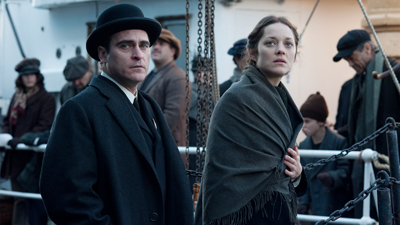 JG: I mean, I wish I could say, “Oh, I’m a genius, I just saw it and had the vision,” but that’s not the case. It had always been there as part of the design of the film. It’s actually in the script, written exactly that way. The idea was an outgrowth really of a very simple set of rules that I set forth for myself narratively. I said, “Okay, the movie’s about this co-dependent relationship.” You know, the surface of the film is period, immigrant mythology, all that stuff, yes it’s in there, but what I always felt the story was really about was two things: this idea that nobody is beneath redemption and that this co-dependent relationship would ensnare these two people; and that these two people would need each other for the worst reasons. It was like the most wrong people to ever meet would meet. So knowing that that was the story, I needed—or wanted—a shot which involved both characters in the last shot of the movie. So if both characters are in the same shot, but they have to go in different directions because you want them to have different paths in their lives, then you can do one of two things. You can have two people walk in different directions in a fork in the road—which Jim Jarmusch did brilliantly in Down By Law for the last shot of that movie, and I don’t wanna rip off Jim. [HTN laughs] So then I said, “Okay, the alternative is a mirror or reflection of glass or something like that,” so I knew that one character would be reflected walking in one way, and the other character would be reflected going the other way. But the beauty of a reflection is they both seem to be walking in the same direction. So then I thought that was better than the fork in the road—I think, I hope—because it’s more complex, so I said, “Okay great maybe I’ll do that.” And then it really went from there.
JG: I mean, I wish I could say, “Oh, I’m a genius, I just saw it and had the vision,” but that’s not the case. It had always been there as part of the design of the film. It’s actually in the script, written exactly that way. The idea was an outgrowth really of a very simple set of rules that I set forth for myself narratively. I said, “Okay, the movie’s about this co-dependent relationship.” You know, the surface of the film is period, immigrant mythology, all that stuff, yes it’s in there, but what I always felt the story was really about was two things: this idea that nobody is beneath redemption and that this co-dependent relationship would ensnare these two people; and that these two people would need each other for the worst reasons. It was like the most wrong people to ever meet would meet. So knowing that that was the story, I needed—or wanted—a shot which involved both characters in the last shot of the movie. So if both characters are in the same shot, but they have to go in different directions because you want them to have different paths in their lives, then you can do one of two things. You can have two people walk in different directions in a fork in the road—which Jim Jarmusch did brilliantly in Down By Law for the last shot of that movie, and I don’t wanna rip off Jim. [HTN laughs] So then I said, “Okay, the alternative is a mirror or reflection of glass or something like that,” so I knew that one character would be reflected walking in one way, and the other character would be reflected going the other way. But the beauty of a reflection is they both seem to be walking in the same direction. So then I thought that was better than the fork in the road—I think, I hope—because it’s more complex, so I said, “Okay great maybe I’ll do that.” And then it really went from there.
The shot is a series of visual effects plates; it was really designed. Like I said, it was not some genius work of improvisation or something. It was really designed from the very beginning and we shot plates for it. It was all part of the design.
HTN: I rewatched the movie this weekend to prep for this and frankly just to appreciate it again. Because I know how important celluloid authenticity is to you, were you nervous going into this knowing that you would have to depend on so much post-production VFX to bring your vision to its fullest life? Even on a second viewing, all of that work felt totally seamless to me.
JG: I’m glad you feel that way. How’d the picture hold up for ya? You can be honest with me.
HTN: It was richer for me the second time around, though I should clarify that I went into my first viewing with a ton of expectation. I wasn’t at Cannes or in NYC when it opened so I was seeing it comparatively late in the game and at that point I feel like while I loved it, my bar of expectation was preventing me from fully giving into it the way I was able to the second time around.
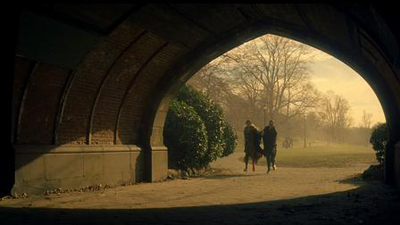 JG: I’m glad to hear it. In answer to your question, I of course was obsessed with maintaining a filmic quality. One of my favorite movies of all-time is Jacques Tati’s Playtime. Which you would never watch and think feels realistic on any level unless you were a crazy person. [HTN laughs] But what it does have is an authenticity and a humanity; it’s not synthetic. It’s actually about a synthetic world, or the introduction of synthetic aspects to the world, which is ironic. But it has a brilliant humanity in it. And I find that the technology of cinema sometimes gets in the way of expressing a basic humanity. The digital world has brought an extra layer of artifice, which is the very thing as filmmakers that we’re always trying to destroy. So of course I was concerned about that, I mean, how could you not be? Plus, I’m such a die-hard film guy. So you’re introducing this new technology, but in the end I wound up really loving it because it’s just another tool for you to use. It’s like if you open up the set of paints, and all of a sudden you’ve got like a nice new fan brush you can use. So you have to look at it that way.
JG: I’m glad to hear it. In answer to your question, I of course was obsessed with maintaining a filmic quality. One of my favorite movies of all-time is Jacques Tati’s Playtime. Which you would never watch and think feels realistic on any level unless you were a crazy person. [HTN laughs] But what it does have is an authenticity and a humanity; it’s not synthetic. It’s actually about a synthetic world, or the introduction of synthetic aspects to the world, which is ironic. But it has a brilliant humanity in it. And I find that the technology of cinema sometimes gets in the way of expressing a basic humanity. The digital world has brought an extra layer of artifice, which is the very thing as filmmakers that we’re always trying to destroy. So of course I was concerned about that, I mean, how could you not be? Plus, I’m such a die-hard film guy. So you’re introducing this new technology, but in the end I wound up really loving it because it’s just another tool for you to use. It’s like if you open up the set of paints, and all of a sudden you’ve got like a nice new fan brush you can use. So you have to look at it that way.
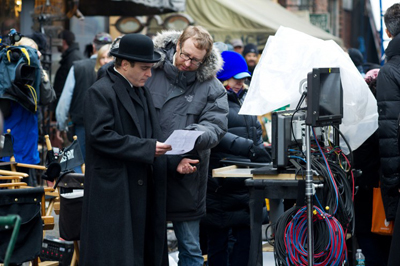 What I resent is people who say, “Film is old, who cares about film, now we’ve got digital.” Well, that’s fine. You can go shoot your movie on digital, that’s great. But there are other people who want to use a different medium. The problem is when you get rid of film you can’t choose that anymore. It’s not that digital objectively sucks, although it’s not my taste. Fine, you wanna shoot digital, that’s great! But the thing… I read somewhere, I think it was Mike Leigh who criticized what Tarantino was saying about film was “bollocks” or something, and I felt that what Mike Leigh said was bollocks. Because he’s basically saying that what the artist wants to use doesn’t matter. And how can that be the case? Would he walk up to a painter and say, “That tube of cadmium red light, you can’t use that anymore, and if you wanna use cadmium red light, bollocks!” [HTN laughs] You know what I’m saying? Well fuck that guy! Whaddya mean “bollocks?” I found that pretty awful, I have to say. I mean, maybe I didn’t read it in context, maybe he was meaning something else. Then I read something else, I think it was Mike Leigh but I’m not sure who it was now, but he was saying also in connection to Tarantino’s comments like, “Oh, now there are all these amazing movies on video.” I don’t know what the fuck he’s watching because maybe there are all these incredible films I’m missing that are on YouTube, but everything I see on YouTube sucks. [HTN laughs] So this digital revolution, which was supposed to bring all this “amazing” new cinema. Guess what? You watch Virgin Spring, which was made, what, 50 years ago, and that’s better than any YouTube video I’ve seen recently. So I don’t know what he thinks technology has brought to us.
What I resent is people who say, “Film is old, who cares about film, now we’ve got digital.” Well, that’s fine. You can go shoot your movie on digital, that’s great. But there are other people who want to use a different medium. The problem is when you get rid of film you can’t choose that anymore. It’s not that digital objectively sucks, although it’s not my taste. Fine, you wanna shoot digital, that’s great! But the thing… I read somewhere, I think it was Mike Leigh who criticized what Tarantino was saying about film was “bollocks” or something, and I felt that what Mike Leigh said was bollocks. Because he’s basically saying that what the artist wants to use doesn’t matter. And how can that be the case? Would he walk up to a painter and say, “That tube of cadmium red light, you can’t use that anymore, and if you wanna use cadmium red light, bollocks!” [HTN laughs] You know what I’m saying? Well fuck that guy! Whaddya mean “bollocks?” I found that pretty awful, I have to say. I mean, maybe I didn’t read it in context, maybe he was meaning something else. Then I read something else, I think it was Mike Leigh but I’m not sure who it was now, but he was saying also in connection to Tarantino’s comments like, “Oh, now there are all these amazing movies on video.” I don’t know what the fuck he’s watching because maybe there are all these incredible films I’m missing that are on YouTube, but everything I see on YouTube sucks. [HTN laughs] So this digital revolution, which was supposed to bring all this “amazing” new cinema. Guess what? You watch Virgin Spring, which was made, what, 50 years ago, and that’s better than any YouTube video I’ve seen recently. So I don’t know what he thinks technology has brought to us.
HTN: My last two movies have been Super-16 and I’m trying to fight for it one more time. I personally prefer the grainy, grittier image of that smaller celluloid image.
JG: It’s funny you mention that because I’m contemplating shooting Super-16 for part of the film I’m about to do. Wes Anderson shot Moonrise Kingdom on Super-16.
HTN: Yep. But like you said, it’s not about me saying that Super-16 is the only way to go. It’s about it being an option. I actually thought Mr. Turner looked pretty incredible for being a period film shot on an Alexa.
JG: It does! This is not to say Mike Leigh has no talent. Of course he does. It’s not to say Mr. Turner looked terrible. Of course it didn’t, it looked great. But that doesn’t mean that that’s the only way you do it.
HTN: Before we wrap up, I want to ask you a question about writing. Your films are constantly growing in scope and ambition, which is to say that you’re faced with more production challenges inherently because of that. When you sit down to write a new script, how are you able to block out the practicalities of production and let your imagination take you wherever it wants to go? I find that it’s getting harder for me to block that stuff out the more movies that I actually make.
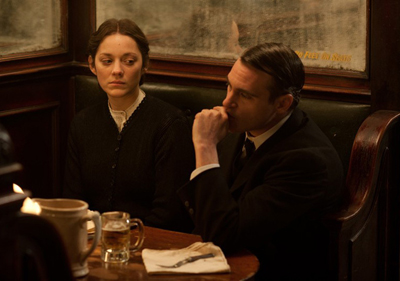 JG: You know, that’s a very good question and I have to tell you, I have a lot of flaws as a person, as a creative person I’m a very flawed individual, obviously, aren’t we all… [HTN laughs] But I don’t have that flaw. When I’m writing, I don’t censor myself in terms of the ambition of it. I never think about that. I never do. Because I feel like if I did, I wouldn’t be able to make the movie. If I had said to myself, I’m gonna write a movie—I’m thinking about it now, by the way—I’m gonna go write a movie, it takes place in 1921, I’m gonna take over Ellis Island, a woman’s gonna be forced into prostitution, I’m gonna cast Marion Cotillard and Joaquin Phoenix and Jeremy Renner, I would think I would never be able to get that movie made.
JG: You know, that’s a very good question and I have to tell you, I have a lot of flaws as a person, as a creative person I’m a very flawed individual, obviously, aren’t we all… [HTN laughs] But I don’t have that flaw. When I’m writing, I don’t censor myself in terms of the ambition of it. I never think about that. I never do. Because I feel like if I did, I wouldn’t be able to make the movie. If I had said to myself, I’m gonna write a movie—I’m thinking about it now, by the way—I’m gonna go write a movie, it takes place in 1921, I’m gonna take over Ellis Island, a woman’s gonna be forced into prostitution, I’m gonna cast Marion Cotillard and Joaquin Phoenix and Jeremy Renner, I would think I would never be able to get that movie made.
HTN: Yep.
JG: But I didn’t think about that. I just thought, Well I’m gonna just do it the best I can, and then I’ll kind of back in to the number. Whatever they give me, I’ll figure it out. You know, Hester Street was made for a nickel. So if I gotta do that, I’ll do that.
I don’t think about that because that to me is self-censorship. The worst thing you can do is to censor yourself. The rest of the world is looking to censor you. The rest of the world, the market, this “market God,” this tragic thing that sits out there, this oppressive force, which has been made even more oppressive since the death of the Soviet Union, which has governed all our lives to such a degree, hates you as an artist. It hates you, this force. So fuck that market force! Fight it!
You know, it’s interesting. I’m not an old guy. I’m 45 years old. But I’m not a young guy either, and I see young people and I ask myself, “What is selling out now?” Nobody sells out now. Everybody sells out because nobody sells out. In other words, the market is so obviously the God, there is no more counter force—now, the Soviet Union was ineptly run and that’s not a viable functioning society obviously, but it at least was some kind of counterweight ideologically. And today there’s no ideological counterweight. So people who are 16 and 17, “Eh, just gotta go make a lotta money,” and there’s nothing to argue that point. In the ‘60s there was a kind of counterculture that’s gone because everyone thinks, “Uhhhh, just gotta go make a lotta money.” So we can’t let that win. That’s a bullshit idea. That’s an idea that kills art. So fuck that I say, don’t ever let that get into your head!
— Michael Tully







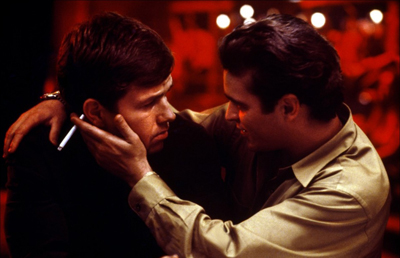

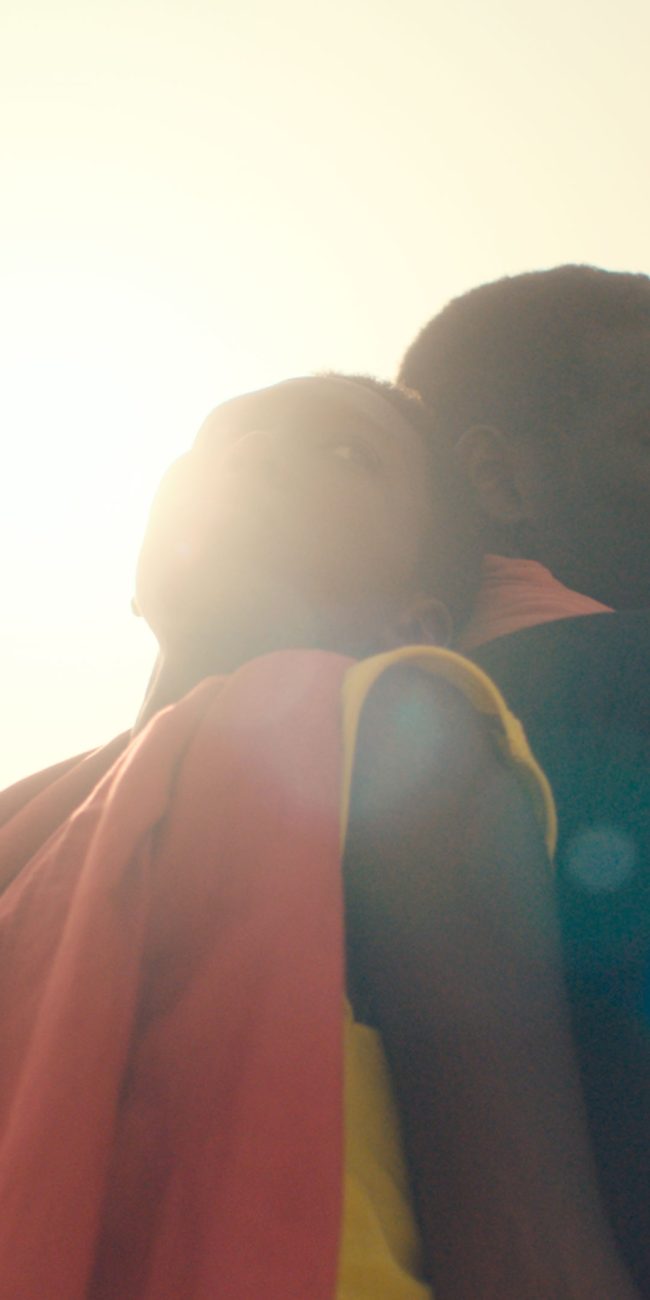
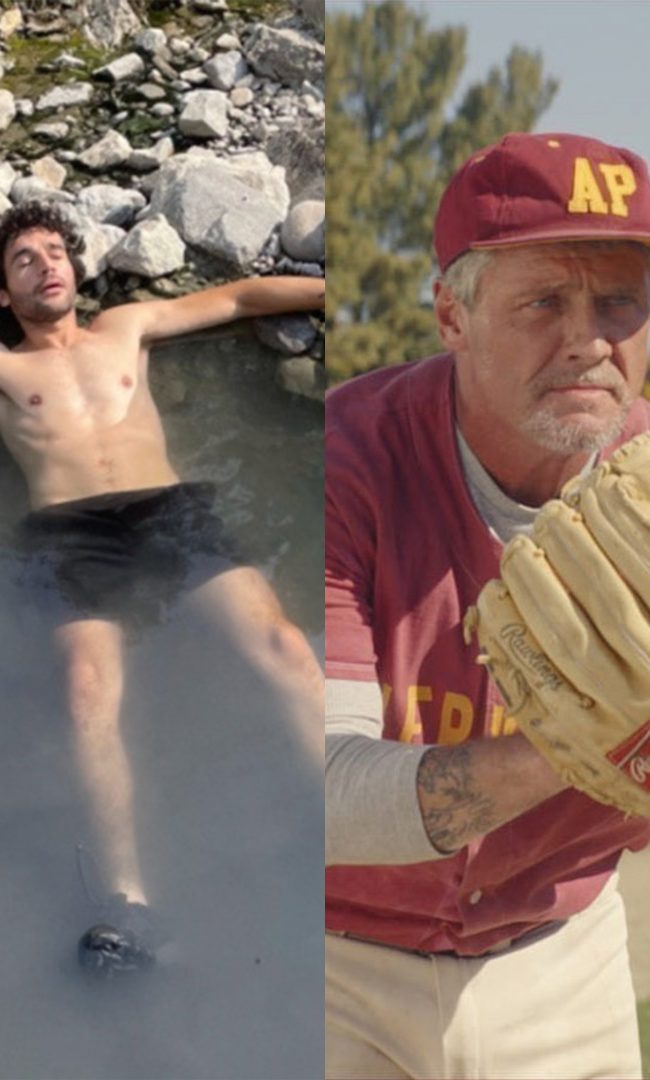


Pingback: Sin and Redemption in The Immigrant | Bright Wall/Dark Room